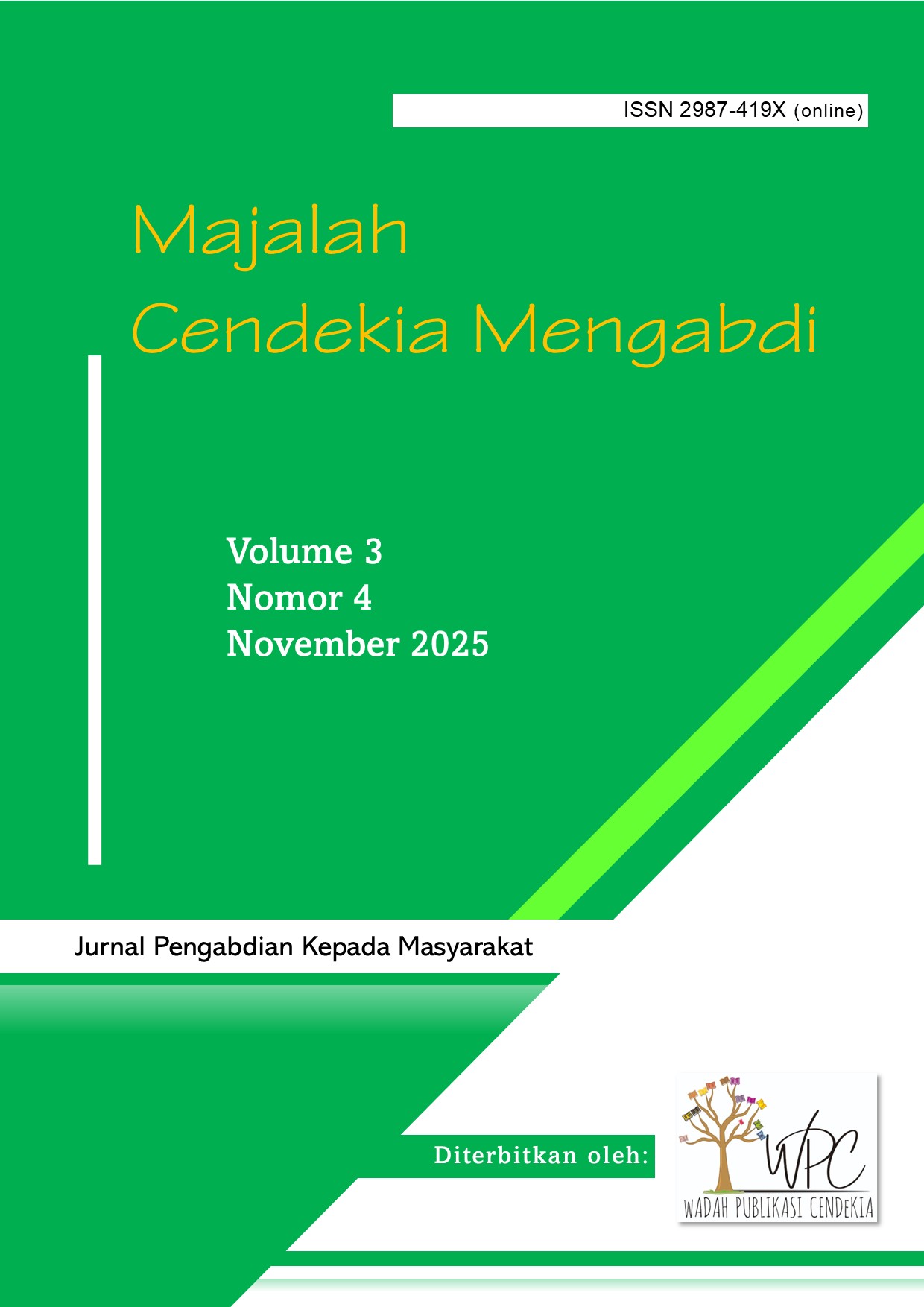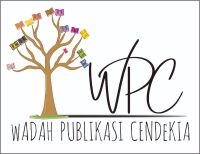Cerdas (Cegah, Edukasi, Sayangi Diri): Program Remaja Sehat Bebas Penyakit Menular Seksual
DOI:
https://doi.org/10.63004/mcm.v3i4.825Kata Kunci:
Edukasi kesehatan, Pengabdian masyarakat, PMS, remajaAbstrak
Pendahuluan: Penyakit Menular Seksual (PMS) merupakan masalah kesehatan global yang berdampak besar terhadap remaja. Minimnya edukasi dan adanya stigma sosial menyebabkan rendahnya pemahaman tentang pencegahan PMS. Pentingnya edukasi sejak dini mengenai PMS adalah karena tanpa intervensi yang memadai, remaja berisiko tinggi terjangkit PMS akibat perilaku seksual berisiko, minimnya akses terhadap informasi dan layanan reproduksi, serta kesulitan mengambil keputusan sehat. Jika edukasi tidak dilakukan, konsekuensinya bisa meliputi penularan penyakit, komplikasi kesehatan jangka panjang seperti infertilitas dan komplikasi kehamilan, serta beban psikososial dan finansial bagi individu maupun sistem kesehatan. Data terbaru menunjukkan bahwa di Indonesia, remaja termasuk kelompok paling rentan terhadap IMS prevalensi IMS pada perempuan usia 15–24 tahun mencapai sekitar 17,1 %. Selain itu, tinjauan literatur periode 2015–2023 mencatat prevalensi HIV/AIDS sebesar 0,3 %, sifilis 1,2 %, serta gonore pada kelompok remaja cukup tinggi. Angka-angka ini semakin mempertegas urgensi edukasi reproduksi yang komprehensif dan berkelanjutan untuk remaja sebagai strategi preventif yang sangat dibutuhkan.
Tujuan: Memberikan edukasi kepada siswa SMA 1 Sungai Tabuk terkait PMS, termasuk pengertian, jenis, penularan, dan pencegahannya.
Metode: Metode pelaksanaan kegiatan dilakukan melalui pendekatan edukatif-partisipatif, yang melibatkan siswa SMA 1 Sungai Tabuk sebagai subjek aktif dalam proses pembelajaran.
Hasil: Terdapat peningkatan skor pengetahuan pada sebagian besar siswa. Beberapa siswa mengalami peningkatan signifikan (hingga +38 poin). Edukasi berhasil meningkatkan kesadaran mengenai risiko PMS dan pentingnya menjaga kesehatan reproduksi.
Simpulan: Program edukasi berbasis sekolah efektif meningkatkan pemahaman remaja tentang PMS serta dapat dijadikan strategi preventif dalam mencegah perilaku berisiko.
Unduhan
Referensi
Ashari, A. (2025). Exploring sociodemographic determinants… sexual behavior among adolescents in Indonesia. Sexual and Behavioral Health Journal (LWW). https://journals.lww.com/shbh/fulltext/2025/01000/exploring_sociodemographic_determinants__an.6.aspx
Başar, F., Yavuz, B., & Sağlam, H. Y. (2021). Evaluation of the effectiveness of reproductive health education program given to adolescents. Journal of Pediatric Research, 8(4), 469–478. https://doi.org/10.4274/jpr.galenos.2021.99266 DOI: https://doi.org/10.4274/jpr.galenos.2021.99266
Belet, I., Putri, N., & Ramadani, R. (2023). Pendidikan kesehatan reproduksi pada remaja. ResearchGate. https://www.researchgate.net/publication/370782377_PENDIDIKAN_KESEHATAN_REPRODUKSI_PADA_REMAJA
Bhatta, B. R., Kiriya, J., Shibanuma, A., & Jimba, M. (2021). Parent–adolescent communication on sexual and reproductive health and the utilization of adolescent-friendly health services in Kailali, Nepal. PLOS ONE, 16(2), e0246917. https://doi.org/10.1371/journal.pone.0246917 DOI: https://doi.org/10.1371/journal.pone.0246917
Dharmayani, R. A. (2025). Adolescent engagement strategies in MOOCs: A rapid review. Journal of Open and Distributed Learning, 4(2), 45–58. https://doi.org/10.1080/28355245.2025.2489394 DOI: https://doi.org/10.1080/28355245.2025.2489394
Diarsvitri, W., & Utomo, I. D. (2022). Medical perspective of reproductive health education in Indonesian schoolbooks. Frontiers in Public Health, 10, 943429. https://doi.org/10.3389/fpubh.2022.943429 DOI: https://doi.org/10.3389/fpubh.2022.943429
Dodd, S., Widnall, E., Russell, A. E., Curtin, E. L., Simmonds, R., Limmer, M., & Kidger, J. (2022). School-based peer education interventions to improve health: A global systematic review of effectiveness. BMC Public Health, 22, 2247. https://doi.org/10.1186/s12889-022-14688-3 DOI: https://doi.org/10.1186/s12889-022-14688-3
Fitriasari, E., & Umasugi, M. T. (2024). Efektivitas intervensi pendidikan kesehatan terhadap peningkatan pengetahuan: studi quasi-eksperimental pada mahasiswa (PDF). Jurnal Kesehatan Masyarakat Indonesia, 2(1), 12–17. https://doi.org/10.62017/jkmi DOI: https://doi.org/10.62017/jkmi.v2i1.2186
Fonner, V. A., Armstrong, K. S., Kennedy, C. E., O'Reilly, K. R., & Sweat, M. D. (2022). School-based sexuality education interventions to prevent HIV and sexually transmitted infections in low- and middle-income countries: A systematic review and meta-analysis. International Journal of Environmental Research and Public Health, 19(3), 1231. https://doi.org/10.3390/ijerph19031231 DOI: https://doi.org/10.3390/ijerph19031231
Freeman, J. L. (2023). How adolescents trust health information on social media. (Article). Elsevier / Social Science & Medicine (available via ScienceDirect). https://doi.org/10.1016/j.socscimed.2023.115000 DOI: https://doi.org/10.1016/j.acap.2022.12.011
Gani, S. (2022). Pengaruh pendidikan kesehatan reproduksi terhadap pengetahuan remaja. Jurnal Pengabdian Masyarakat Abulyatama, 3(2), 123–131. https://jurnal.abulyatama.ac.id/index.php/Abdimas/article/view/6253
Janighorban, M., Boroumandfar, Z., Pourkazemi, R., & Mostafavi, F. (2022). Barriers to vulnerable adolescent girls' access to sexual and reproductive health services: A qualitative study. BMC Public Health. https://doi.org/10.1186/s12889-022-14687-4. DOI: https://doi.org/10.1186/s12889-022-14687-4
Kapadia, R., Nurbani, N., & Agustina, M. (2022). Pengaruh Participatory Learning Approach (PLA) terhadap Pengetahuan dan Kesadaran Ibu dalam Pencegahan Stunting. Bima Nursing Journal, 3(2), 109–117. https://doi.org/10.32807/bnj.v3i2.873 DOI: https://doi.org/10.32807/bnj.v3i2.873
Kementerian Kesehatan Republik Indonesia. (2025, Juni 20). Per Maret 2025, Kemenkes temukan 356.638 orang dengan HIV di RI. Antara News. https://www.antaranews.com/berita/4913705/per-maret-2025-kemenkes-temukan-356638-orang-dengan-hiv-di-ri
Kementerian Kesehatan Republik Indonesia. (2025, Juni 21). Berani Tes, Berani Lindungi Diri, Kemenkes Targetkan Eliminasi HIV dan IMS Tahun 2030. https://kemkes.go.id/id/berani-tes-berani-lindungi-diri-kemenkes-targetkan-eliminasi-hiv-dan-ims-tahun-2030
Melese, M. (2024). Parent–adolescent communication on sexual and reproductive health issues: Addressing low communication levels. Frontiers in Public Health. https://doi.org/10.3389/fpubh.2024.1342027 DOI: https://doi.org/10.3389/fpubh.2024.1342027
Nilasari, H., Indriatmi, W., Gunardi, H., Kayika, I. P. G., Kekalih, A., Siregar, K. N., … Haswinzky, R. A. (2022). Developing an online reproductive health module on sexually transmitted infections for Indonesian adolescents: A qualitative mixed methods study. Medical Journal of Indonesia. https://doi.org/10.13181/mji.oa.247635 DOI: https://doi.org/10.13181/mji.oa.247635
Noer, K. U., Kusmawati, A., & Nurfadhilah. (2025). "Do not ask, do not tell": The dark path of sexual and reproductive health education in Indonesia. Multidisciplinary Science Journal, 7(6), e2025311. https://doi.org/10.31893/multiscience.2025311 DOI: https://doi.org/10.31893/multiscience.2025311
Pan, S. C., & Carpenter, S. K. (2023). Prequestioning and pretesting effects: A review of empirical research, theoretical perspectives, and applications. Educational Psychology Review, 35(4), 65–89. https://doi.org/10.1007/s10648-023-09814-5 DOI: https://doi.org/10.31234/osf.io/9rqpm
Sari, D. N., Putri, A. R., & Hidayat, R. (2024). The role of reproductive health education in enhancing self-efficacy and preventive behavior against sexually transmitted infections among adolescents in Indonesia. BMC Public Health, 24(1), 221. https://doi.org/10.1186/s12889-024-0211
Sibua, A. (2025). Edukasi kesehatan reproduksi remaja melalui ceramah interaktif, diskusi, dan tanya jawab. Jurnal Pengabdian Masyarakat Omnia, 2(1), 55–63. https://omnijournal.id/index.php/pengmas/article/download/65/67
Singh, D. R., Shrestha, S., Karki, K., Sunuwar, D. R., Khadka, D. B., & Maharjan, D. (2023). Parental knowledge and communication with their adolescent children about sexual and reproductive health issues in Lalitpur, Nepal. PLOS ONE, 18(7), e0289116. https://doi.org/10.1371/journal.pone.0289116 DOI: https://doi.org/10.1371/journal.pone.0289116
Sung, H., Kim, S., & Lee, J. (2023). Effects of holistic sexual education interventions on adolescents: A meta-analysis. Healthcare, 11(18), 2511. https://doi.org/10.3390/healthcare11182511 DOI: https://doi.org/10.3390/healthcare11182511
Usonwu, I., Ahmad, R., & Curtis-Tyler, K. (2021). Parent–adolescent communication on adolescent sexual and reproductive health: A qualitative evidence synthesis. Reproductive Health, 18, Article 1. https://doi.org/10.1186/s12978-021-01246-0. DOI: https://doi.org/10.1186/s12978-021-01246-0
Widayani, W., Ulfah, K., Hufad, A., & Hasanah, V. R. (2025). Reproductive health education to improve knowledge and attitudes among blind adolescents using Braille modules: A pre-post test study. Health Education Reports, 13(s1), 13562. https://doi.org/10.4081/hls.2025.13562 DOI: https://doi.org/10.4081/hls.2025.13562
Wirawan, G. B. S., Gustina, N. L. Z., & Januraga, P. P. (2022). Open communication about reproductive health is associated with comprehensive HIV knowledge and a non-stigmatising attitude among Indonesian youth: A cross-sectional study. Journal of Preventive Medicine and Public Health, 55(4), 342–350. https://doi.org/10.3961/jpmph.21.581 DOI: https://doi.org/10.3961/jpmph.21.581
World Health Organization. (2025). Sexually transmitted infections (STIs) fact sheet. Retrieved from https://www.who.int/news-room/fact-sheets/detail/sexually-transmitted-infections-%28stis%29
Yamani, L. N., Astutik, E., Qurniyawati, E., Lusida, M. I., Getaneh, Y., & Kelly, M. (2025). Associations between socio-demographics, sexual knowledge and behaviour and sexually transmitted infections among reproductive-age women in Southeast Asia: Demographic Health Survey results. BMC Public Health, 25(1), 738. https://doi.org/10.1186/s12889-025-21962-7 DOI: https://doi.org/10.1186/s12889-025-21962-7
Yang, X., Ye, Q., Su, S., & Li, X. (2025). Effectiveness of a pre-test/post-test model in HPV health education among undergraduate medical students. BMC Medical Education, 25, 158. https://doi.org/10.1186/s12909-025-06717-7 DOI: https://doi.org/10.1186/s12909-025-06717-7
Zakiyyah, R., Lestari, R., & Hidayat, A. (2025). Pengaruh pendidikan kesehatan reproduksi dengan metode ceramah interaktif terhadap pengetahuan siswa. Jurnal Pengabdian Masyarakat Indonesia, 6(3), 45–52. https://jpmi.journals.id/index.php/jpmi/article/download/3637/558/11863
Zhu, Y., Chen, Y., & Wu, Y. (2024). Effectiveness of pre-test and post-test design in HPV health education: A quasi-experimental study. BMC Medical Education, 24(1), 112–121. https://pubmed.ncbi.nlm.nih.gov/39891201/
Unduhan
Diterbitkan
Cara Mengutip
Terbitan
Bagian
Lisensi
Hak Cipta (c) 2025 Dini Rahmayani, Winda Ayu Fazraningtyas, Umi Hanik Fetriyah, Namira Talitha Yamani, Neli Maulida, Neni Grencia, Ni Nyoman Jero Andini, Niluh Putu Asti Purnama Sari, Normala, Nur Anisa, Nurlina Nazmi, Putri Salsabila, Ranisa Mukti, Renaldy Fadlianoor, Rinita, Risqina Meilin Shabilla, Ritni

Artikel ini berlisensi Creative Commons Attribution-NonCommercial 4.0 International License.









